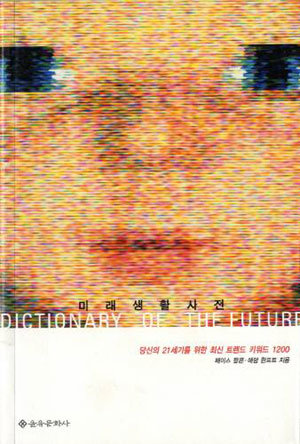Future Words

One day during the 1990s, one person predicted that there would come a day in 2006 where the highways of South Korea would be dominated by quick service motorcycles and the night roads of Seoul would be filled with proxy drivers. That person was Faith Popcorn. He advises international companies on business strategies as a trend analyst, picking out from the myriad of willow-the-wisp trends the ones that will last for more than a decade. He is the marketing Nostradamus who knew 10 years ahead of the world that quick service would deliver brown packages to your door, and that a living would be carved for proxy drivers who would drive drunken people to their homes.
Faith Popcorn wrote the witty, futuristic book Dictionary of the Future, which is loved by dreamers of the future everywhere. With words that might be used in the future listed like a dictionary, this book draws a useful map for the mega-trends of the murky future.
Most prophetic books draw the readers attention in the beginner, only to lose it later with miscalculations, but this book gets better and better with age. With each new word that he created popping up as time goes by, readers are thrilled to read the true book of the future.
This book spews out 1200 words in 35 categories, giving readers mosaic images of subjects like aging, newly created professions, and telecommunications. The big picture of the future that he predicts can be said to be a specialized and highly individualistic society. In the future, products will cater to the various tastes of individuals, jobs will be created that make these products, and there will be general socio-cultural changes. Magazines will be filled with content the subscriber ordered, called, Mygazines, and web gardeners will manage personal websites.
Of course, theres no telling if all the words in the dictionary will ever appear in real life. Faith Popcorn predicted that retired baby-boomers will make a yogurt city and wild animal comeback trainers will teach wild animals to roam free again, but theres no reason to spite him because the words never surfaced. If you dont obsess over each word, but focus on the whole forest that he calls the future, this book is still valid.
If youre wondering about the future in this era of light-speed science technology, pick up this book. Stroll through this imaginary garden of language, and feel free to peruse it in any order youd like. Youre the gardener who will water these plants and watch them grow into the forest of the future.







